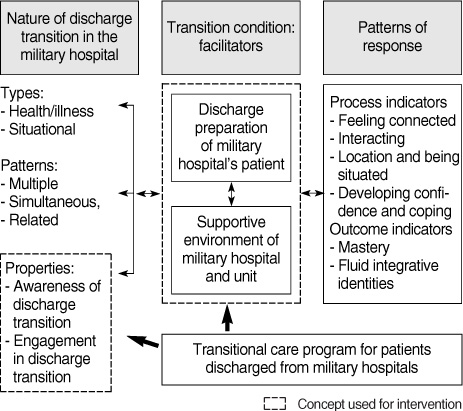J Korean Acad Nurs.
2010 Aug;40(4):599-609. 10.4040/jkan.2010.40.4.599.
Development and Evaluation of a Transitional Care Program for Patients Discharged from Military Hospitals
- Affiliations
-
- 1Department of Nursing, Armed Forces Nursing Academy, Daejeon, Korea. afna4551@mnd.go.kr
- KMID: 1073082
- DOI: http://doi.org/10.4040/jkan.2010.40.4.599
Abstract
- PURPOSE
The purpose of this study was to develop and evaluate a transitional care program for patients discharged from military hospitals. The study consists of two phases: developing the program and evaluating its effectiveness.
METHODS
The conceptual framework used to guide the development of the program was Meleis's transition theory. A quasi-experimental design was employed for this study. Participants were recruited from patients discharged from one military hospital, 72 in the control group and 56 in the experiment group. Data were analyzed using SPSS WIN 12.0 program with chi-square, Fisher's exact test, independent t-test, and mixed model.
RESULTS
Participants in the transitional care program reported promoting a positive personal condition, and more healthy patterns of response in the first week after being discharged and a smoother discharge transition.
CONCLUSION
The transitional care program developed for discharge patients from military hospital promoted discharge readiness and promoted smooth discharge transition.
MeSH Terms
Figure
Reference
-
1. Anthony MK, Hudson-barr D. A patient-centered model of care for hospital discharge. Clinical Nursing Research. 2004. 13:117–136.2. Cho IS, Park YS. Transition model of middle-aged women. Journal of Korean Academy of Nursing. 2004. 34:515–524.3. Cohen J. Statistical power analysis for the behavioral sciences. 1988. 2nd ed. New Jersey: Lawrence Erlbaum Associate.4. Davidson PM, Dracup K, Phillips J, Padilla G, Daly J. Maintaining hope in transition: A theoretical framework to guide intervention for people with heart failure. Journal of Cardiovascular Nursing. 2007. 22:58–64.5. Davis S. Meleis's theory of nursing transitions and relatives' experiences of nursing home entry. Journal of Advanced Nursing. 2005. 52:658–671.6. Kralik D, Visentin K, VanLoon A. Integrative literature review and meta-analyses. Transition: A literature review. Journal of Advanced Nursing. 2006. 55:320–329.7. Lee JS, Park MH, Kim JH. A descriptive study on health management of soldiers after hospitalization. Journal of the Korean Military Medical Association. 2002. 34:208–228.8. Lynn MR. Determination and quantification of content validity. Nursing Research. 1986. 35:382–385.9. Meleis AI, Sawyer LM, Im EO, Hilfinger Messias DK, Schumacher KL. Experiencing transitions: An emerging middle-range theory. Advances in Nursing Science. 2000. 23:12–28.10. Murphy SA. Human responses to transition: A holistic nursing perspective. Holistic Nursing Practice. 1990. 4(3):1–7.11. Park YS. Transition to motherhood of primipara in postpartum period. 1991. Seoul: Seoul National University;Unpublished doctoral dissertation.12. Schlossberg NK. A model for analyzing human adaptation to transition. The Counseling Psychologist. 1981. 9(2):2–18.13. Schumacher KL, Meleis AI. Transition: A central concept in nursing. Journal of Nursing Scholarship. 1994. 26:119–127.14. Sindhu S, Suttipong C, Ratinthorn A. Nursing therapeutic for research application of transition theory. Meeting Dr. Afaf Ibrahim Meleis: Situation-specific theory and transition theory. 2007. 02. In : Conference conducted at Chungnam National University International Annual Conference; Daejon, Korea. K. O. Oh (Chair).15. Shin HJ. Maternal transition in mothers with high risk newborns. Journal of Korean Academy of Nursing. 2004. 34:243–251.16. Shin TS. A study on the relationship between the solider's ego identity and the solider's adjustment during army life. 1982. Seoul: Yonsei University;Unpublished master's thesis.17. Walker LO, Avant KC. Strategies for theory construction in Nursing. 2005. 4th ed. New Jersey: PEARSON Prentice Hall.18. Weiss ME, Piacentine LB. Psychometric properties of the readiness for hospital discharge scale. Journal of Nursing Measurement. 2006. 14:163–180.19. Weiss ME, Piacentine LB, Ancona J, Gresser S, Toman S, Vega-Stromberg T. Perceived readiness for hospital discharge in adult medical-surgical patients. Clinical Nurse Specialist. 2007. 21:31–42.
- Full Text Links
- Actions
-
Cited
- CITED
-
- Close
- Share
- Similar articles
-
- Development of Items for Transitional Care Service and Outcome Indicators of Discharged Patients for Improvement in Quality of Care
- Nursing Case Management Program Development for the Elderly at Hospital
- Characteristics of Traumatic Brain Injury Patients in Korean Military Hospitals During Non-War Years
- Development of an Evaluation Tool for the Nursing Care Quality by 4GL
- Experiences of Blood Bank Performance in Brian Allgood Army Community Hospital


